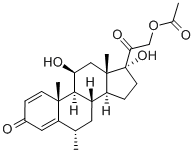All AbMole products are for research use only, cannot be used for human consumption.

For this product's availability, delivery time and price, please email [email protected] directly or click the "Inquiry Now" button below.
Methylprednisolone (NSC-19987, Medrol) acetate is a synthetic glucocorticoid receptor agonist, used to achieve prompt suppression of inflammation. Methylprednisolone activates ACE2 and reduces IL-6 levels, thus improves severe or critical COVID-19. Methylprednisolone markedly reduces autophagy and apoptosis.
| Molecular Weight | 416.51 |
| Formula | C24H32O6 |
| CAS Number | 53-36-1 |
| Solubility (25°C) | DMSO 86 mg/mL |
| Storage |
Powder -20°C 3 years ; 4°C 2 years In solvent -80°C 6 months ; -20°C 1 month |
| Related Products |
|---|
| DSPE-PEG-FA
DSPE-PEG2K-FA is a PEG derivative containing folic acid. DSPE-PEG2K-FA has a targeting effect and can bind to folic acid receptors in cancer cells. DSPE-PEG2K-FA forms micelles/lipid bilayers and can be used in research on targeted drug delivery systems. |
| Lifastuzumab
Lifastuzumab is a humanized anti-NaPi2b IgG1 monoclonal antibody. |
| GPVI antagonist 1
GPVI antagonist 1 is a glycoprotein VI (GPVI) platelet receptor antagonist. GPVI antagonist 1 inhibits collagen-induced platelet aggregation with an IC50 of 25.3 μM. |
| MPSD TFA
MPSD TFA (MARCKS-ED TFA) is a 25-amino acid peptide based on the effector domain sequence of the intracellular membrane protein myristoylated alanine-rich C-kinase substrate (MARCKS). MPSD TFA can sense membrane curvature and recognize phosphatidylserine. MPSD TFA can be utilized as biological probe to study membrane shape and lipid composition. |
| 4-Nitro-2,1,3-benzoselenadiazole
4-Nitro-2,1,3-benzoselenadiazole is a biochemical material that can be used in scientific research. |
All AbMole products are for research use only, cannot be used for human consumption or veterinary use. We do not provide products or services to individuals. Please comply with the intended use and do not use AbMole products for any other purpose.


Products are for research use only. Not for human use. We do not sell to patients.
© Copyright 2010-2024 AbMole BioScience. All Rights Reserved.
